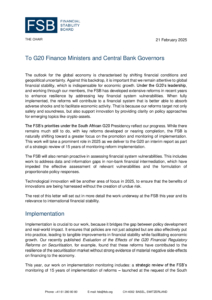Press enquiries:
+41 61 280 8477
[email protected]
Ref: 5/2025
- Under the South African G20 Presidency, the FSB is prioritising the promotion and monitoring of key reforms, with a strategic review and interim report set for delivery in 2025.
- Implementation work also includes a peer review on implementation of the FSB’s global regulatory framework for crypto-asset markets and activities and global stablecoin arrangements.
- Letter outlines key issues the FSB is working on in 2025, including cross-border payments, non-bank financial intermediation, digital innovation and climate-related financial risks.
The Financial Stability Board (FSB) today published a letter from its Chair, Klaas Knot, to G20 Finance Ministers and Central Bank Governors ahead of their meeting on 26-27 February.
The letter notes that shifting financial conditions and geopolitical uncertainty call for continued vigilance on financial stability. The FSB has developed extensive reforms in recent years to enhance resilience by addressing key financial system vulnerabilities. These reforms target not only safety and soundness, but also support innovation by providing clarity on policy approaches for emerging topics like crypto-assets.
The letter notes that with key reforms developed or nearing completion, the FSB is shifting toward a greater focus on the promotion and monitoring of implementation. This work will take a prominent role in 2025 as the FSB undertakes a strategic review of 15 years of monitoring reform implementation. The review will provide insights into the effectiveness of the monitoring of post-global financial crisis regulatory reforms and identify areas where the FSB can make improvements in the tools it uses to ensure the consistent, global implementation of agreed reforms. The FSB will deliver an interim report on this work to the G20 in October.
The FSB will also remain proactive in assessing financial system vulnerabilities. This includes work to address data and information gaps in non-bank financial intermediation, which have impeded the effective assessment of relevant vulnerabilities and the formulation of proportionate policy responses.
The letter sets out in more detail the work underway this year at the FSB and its relevance to international financial stability.
Notes to editors
The FSB coordinates and oversees the monitoring of the implementation of agreed financial reforms and its reporting to the G20. This includes reporting on members’ commitments and progress in implementing international financial standards and other policy initiatives; conducting peer reviews of FSB members (which are an obligation of membership); and encouraging global adherence to prudential regulatory and supervisory standards.
The FSB coordinates at the international level the work of national financial authorities and international standard-setting bodies and develops and promotes the implementation of effective regulatory, supervisory, and other financial sector policies in the interest of financial stability. It brings together national authorities responsible for financial stability in 24 countries and jurisdictions, international financial institutions, sector-specific international groupings of regulators and supervisors, and committees of central bank experts. The FSB also conducts outreach with approximately 70 other jurisdictions through its six Regional Consultative Groups.
The FSB is chaired by Klaas Knot, President of De Nederlandsche Bank. The FSB Secretariat is located in Basel, Switzerland and hosted by the Bank for International Settlements.
